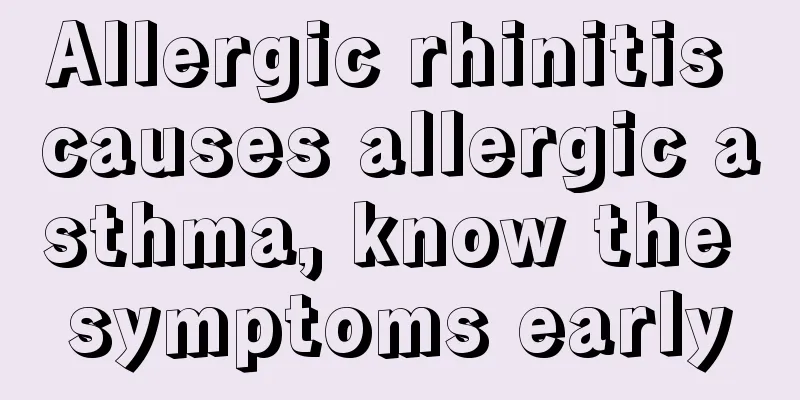Allergic rhinitis causes allergic asthma, know the symptoms early

|
Allergic rhinitis is relatively common, and the incidence rate is increasing. This disease is relatively stubborn, and if not treated in time it will cause allergic asthma. Because many people do not understand the relevant knowledge, they fail to seek timely treatment after allergic rhinitis causes allergic asthma, which delays the best time for treatment and causes the disease to become more and more serious. So let us understand the symptoms of allergic asthma caused by allergic rhinitis. I hope it will be helpful to everyone. 1. Difficulty breathing. Immediately following the prodromal symptoms, there is chest tightness, chest tightness and even a feeling of suffocation, and the chest feels as if it is pressed by a heavy stone. After about 10-15 minutes, breathing difficulties occur, accompanied by a high-pitched wheeze. The patient is forced to sit up and cannot lie flat on his back, with his head tilted forward and his shoulders hunched. Support your knees with your hands and breathe hard. The attack can last from tens of minutes to several hours, and then you can choose to relieve it yourself or it will gradually subside after treatment. 2. Coughing and expectoration. During the prodromal stage, cough is often caused by bronchial mucosal allergy, which is initially dry cough without sputum and varies in severity. During the attack period, the cough often subsides and is replaced by wheezing. When the attack is about to end, bronchospasm and mucosal edema are relieved, and a large amount of secretions are discharged. At this time, the symptoms of coughing and sputum production increase again, and purulent sputum is produced. There are also a few patients who do not have prominent dyspnea symptoms, and cough is the only symptom, which can easily be mistaken for chronic bronchitis. 3. Chest pain. If the asthma attack is severe and lasts for a long time, the patient may experience chest pain, which may be related to excessive fatigue of the respiratory muscles. When combined with pneumothorax, severe chest pain may occur suddenly. 4. Others. Some patients, especially children and young people with more severe asthma attacks, may experience vomiting or even incontinence of stool and urine during an asthma attack. When severe asthma attacks persist, there may be neurological and mental symptoms such as headache, dizziness, fatigue, confusion, drowsiness, and coma. If there is concurrent infection, fever may occur. After the attack, there are often systemic symptoms such as fatigue and weakness. |
<<: Can honey water help sober you up
>>: What are the early symptoms of kidney tumor
Recommend
My neck itches and turns red when I scratch it
Itching may seem like a normal little thing, but ...
Can I eat sweet potatoes during confinement?
People should eat foods rich in nutritional value...
Do electric ear cleaners hurt your ears?
In order to get the dirt out of the ears, people ...
It hurts when I bite hard after filling my tooth
Wenwen's teeth are sometimes eroded by bacter...
How to cure liver cancer and live longer? The most effective way to treat liver cancer
Liver cancer is a relatively serious disease. Amo...
How to reduce swelling and relieve pain in swollen ankles
The ankle joint bears most of the body's weig...
Biochemical examination of esophageal cancer
This method is relatively simple and does not cau...
How many calories are in a bottle of yogurt
Yogurt is a very common drink in people's dai...
What is the cause of arsenic poisoning
Arsenic poisoning should never be ignored, becaus...
What harm does magnesium do to the human body
Magnesium is an essential trace element for our b...
How to cure acne on nose quickly
Acne on the nose is also known as acne. It is a r...
The dangers of mouth breathing
Many people with rhinitis will choose to breathe ...
Can I grow taller after massaging my pituitary gland
Acupoint therapy has become an indispensable meth...
What to do if nails grow into the flesh
We know that nails are very important to us. Our ...
Commonly used chemotherapy drugs for cervical cancer
With the continuous development of chemotherapy d...









